Related Research Articles
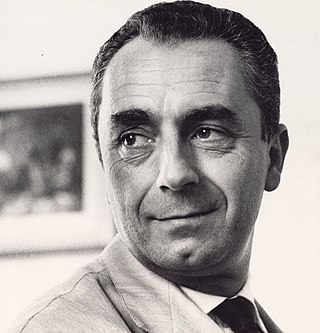
Michelangelo Antonioni was an Italian film director, screenwriter, and editor. He is best known for his "trilogy on modernity and its discontents", including L'Avventura (1960), La Notte (1961), and L'Eclisse (1962); the English-language film Blowup (1966); and the multilingual The Passenger (1975). His films have been described as "enigmatic and intricate mood pieces" that feature elusive plots, striking visual composition, and a preoccupation with modern landscapes. His work substantially influenced subsequent world art cinema.

Henri Langlois was a French film archivist and cinephile. A pioneer of film preservation, Langlois was an influential figure in the history of cinema. His film screenings in Paris in the 1950s are often credited with providing the ideas that led to the development of the auteur theory.

L'Avventura is a 1960 drama film directed by Michelangelo Antonioni. Developed from a story by Antonioni with co-writers Elio Bartolini and Tonino Guerra, the film is about the disappearance of a young woman during a boating trip in the Mediterranean, and the subsequent search for her by her lover and her best friend. It was filmed on location in Rome, the Aeolian Islands, and Sicily in 1959 under difficult financial and physical conditions. The film is noted for its unusual pacing, which emphasizes visual composition, mood, and character over traditional narrative development.

Blowup is a 1966 psychological mystery film directed by Michelangelo Antonioni, co-written by Antonioni, Tonino Guerra and Edward Bond and produced by Carlo Ponti. It is Antonioni's first entirely English-language film and stars David Hemmings, Vanessa Redgrave and Sarah Miles. Model Veruschka von Lehndorff is also featured as herself. The plot was inspired by Argentine-French writer Julio Cortázar's 1959 short story "Las babas del diablo", which was later retitled "Blow-Up" to tie in with the film.
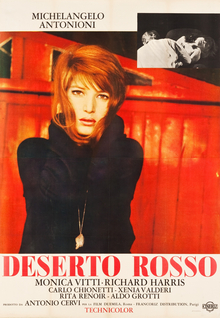
Red Desert is a 1964 psychological drama film directed by Michelangelo Antonioni and starring Monica Vitti and Richard Harris. Written by Antonioni and Tonino Guerra, it was Antonioni's first color film. Set in Northern Italy, the story follows a troubled woman who is unable to adapt to her environment after an automobile accident.
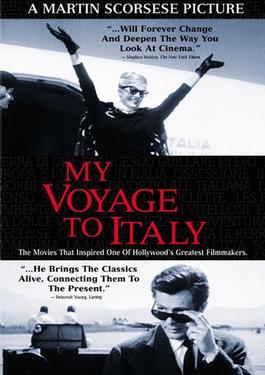
My Voyage to Italy is a personal documentary by acclaimed Italian-American director Martin Scorsese. The film is a voyage through Italian cinema history, marking influential films for Scorsese and particularly covering the Italian neorealism period.

L'Eclisse is a 1962 romantic drama film co-written and directed by Michelangelo Antonioni and starring Alain Delon and Monica Vitti, with Francisco Rabal, Lilla Brignone, and Louis Seigner. Filmed on location in Rome and Verona, the story follows a young woman (Vitti) who pursues an affair with a confident young stockbroker (Delon). Antonioni attributed some of his inspiration for L'Eclisse to when he filmed a solar eclipse in Florence. The film is considered the last part of a trilogy and is preceded by L'Avventura (1960) and La Notte (1961).
Giovanni Fusco was an Italian composer, pianist and conductor, who has written numerous film scores since 1936, including those of Alain Resnais's Hiroshima mon amour (1959) and La guerre est finie (1966), as well as those of most of the 1948-1964 films directed by Michelangelo Antonioni, from N.U. to Il deserto rosso, except for La notte and some of his early short films. Two of his soundtracks, those of Antonioni's Cronaca di un amore and L'avventura, won Silver Ribbon for the best film score from Italian National Syndicate of Film Journalists in 1951 and 1961, respectively.

Identification of a Woman is a 1982 Italian–French drama film directed by Michelangelo Antonioni and starring Tomás Milián, Daniela Silverio, and Christine Boisson. It was awarded the 35th Anniversary Prize at the 1982 Cannes Film Festival.
Cinephilia is the term used to refer to a passionate interest in films, film theory, and film criticism. The term is a portmanteau of the words cinema and philia, one of the four ancient Greek words for love. A person with a passionate interest in cinema is called a cinephile, cinemaphile, filmophile, or, informally, a film buff. To a cinephile, a film is often not just a source of entertainment as they see films from a more critical point of view.
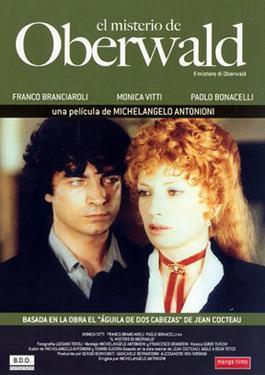
The Mystery of Oberwald is a 1980 Italian–German television drama film directed by Michelangelo Antonioni and starring Monica Vitti, Paolo Bonacelli, and Franco Branciaroli. It is based on the 1946 play L'Aigle à deux têtes by Jean Cocteau.
A cinematheque is an archive of films and film-related objects with an exhibition venue. Similarly to a book library, a cinematheque is responsible for preserving and making available to the public film heritage. Typically, a cinematheque has at least one motion picture theatre, which offers screenings of its collections and other international films.
Lies of Love is a 1949 Italian short documentary film directed by Michelangelo Antonioni about a group of people who pose for photo comics.

Chung Kuo, Cina is a 1972 Italian television documentary directed by Michelangelo Antonioni. Antonioni and his crew were invited to China and filmed for five weeks, beginning in Beijing and travelling southwards. The resulting film was denounced as slanderous by the Chinese Communist Party and the Italian Communist Party.

The 11th annual Berlin International Film Festival was held from 23 June to 4 July 1961.
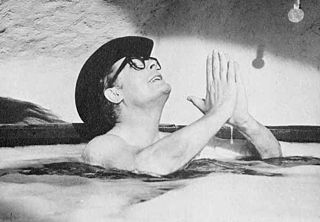
The list of the A hundred Italian films to be saved was created with the aim to report "100 films that have changed the collective memory of the country between 1942 and 1978". Film preservation, or film restoration, describes a series of ongoing efforts among film historians, archivists, museums, cinematheques, and nonprofit organization to rescue decaying film stock and preserve the images they contain. In the widest sense, preservation assures that a movie will continue to exist in as close to its original form as possible.
The 25th annual Venice International Film Festival was held from 27 August to 10 September 1964.
Minimalist cinema is related to the art and philosophy of minimalism.
Modernist film is related to the art and philosophy of modernism.
Gente del Po, sometimes referred to in English as People of the Po Valley, is an Italian documentary short film directed by Michelangelo Antonioni in 1943 and released in 1947. It was Antonioni's debut film and is, together with Luchino Visconti's Ossessione, considered to be one of the earliest examples of Italian neorealism. Gente del Po documents people living on or near the Po river, including barge workers and fishermen.
References
- ↑ "Nettezza urbana". Collins Dictionary. Retrieved 9 September 2023.
- ↑ "Nettezza urbana". Treccani (in Italian). Retrieved 9 September 2023.
- ↑ Kotulla, Theodor, ed. (1964). "Die Krankheit der Gefühle. Ein Gespräch mit Studenten des Centro Sperimentale di Cinematografia in Rom 1961". Der Film. Manifeste, Gespräche, Dokumente. Vol. 2. Munich: Piper.
- ↑ Marrone, Gaetana, ed. (2007). Encyclopedia of Italian Literary Studies. Vol. 1. Routledge. p. 58. ISBN 978-1-57958-390-3 . Retrieved 9 September 2023.
- ↑ "Reinventing Neorealism: Antonioni's Documentaries of the 1940s and '50s". Museum of Modern Art. Retrieved 10 September 2023.
- ↑ "Short Films by Michelangelo Antonioni". BAMPFA. 22 December 2014. Retrieved 10 September 2023.
- ↑ "N.U. (Nettezza urbana)". Cinémathèque Française (in French). Retrieved 10 September 2023.
- ↑ "Red Desert". The Criterion Collection. Retrieved 10 September 2023.